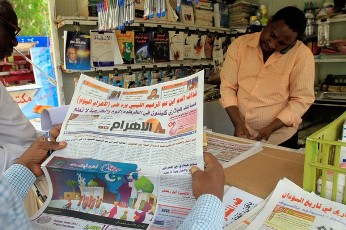Sudanese official says press censorship necessary for political stability
July 17, 2014 (KHARTOUM) – The Sudanese minister of state for information has acknowledged the censorship imposed on press in the country, saying the political situation does not allow for full respect of press freedom.

Despite the pledges made by the Sudanese president to create a conducive environment to promote a national dialogue process he initiated earlier this year, the security apparatus continues to take measures restricting freedom of the press.
On Wednesday, the National Intelligence and Security Services (NISS) confiscated the copies of Alakhbar daily newspaper because they interviewed the former Janjaweed leader Musa Hilal. Also, Almustagulon was confiscated on Thursday.
On the other hand, earlier this month, the NISS ordered the suspension of al-Saiha newspaper less than 24 hours after it resumed publication. The daily had been previously banned by the security apparatus.
The minister of state said that political forces from the right and the left should express their ideas objectively and without quarrels. He further stressed that people have to accommodate themselves to this situation to avoid political instability in the country.
He, however, agreed on the need for a new law to organise freedom of the press and engage in a dialogue on the national security issue, adding that the ruing National Congress Party (NCP) is keen to end these violations of public freedoms.
The censorship affected the credibility of newspapers in Khartoum and led to the closure of 12 newspapers in 2013.
The secretary-general of the Sudanese Journalists Union, Fatih Elsayed, admitted that the repeated censorship and economic factors impede the activities of printed newspapers and contributed to shrinking its distribution by more than 50%.
(ST)
